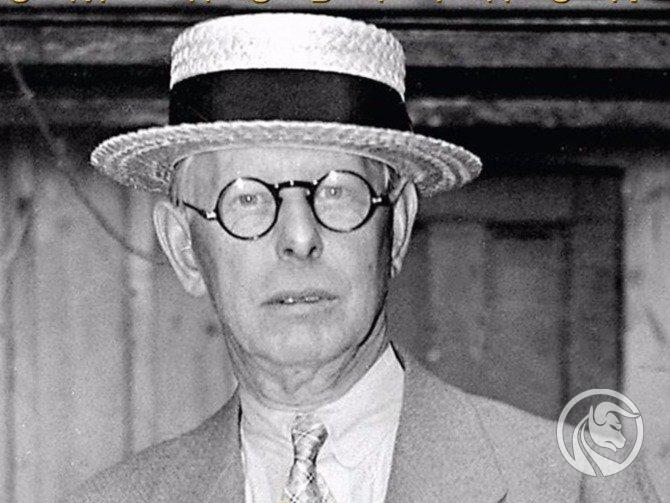The great Wall Street bear, or Jessie Livermore, was making money from falls
Jessie Livermore is one of the leading figures and the most recognizable speculators in the world. His life is a series of falls and ups, great fortunes and bankruptcy several times. This trader has earned an outstanding place in the history of the market. Based on his biography, he was created "Bible of traders"or book "Memories of the stock market player". Was his speculation solely based on coincidence, pure chance and randomness? But did he discover something more that allowed him to bounce back from the bottom?
A huge fortune
 Looking a bit closer to the history of Livermore it's hard to believe that the boy who earned 3,12 $ betting in the buckets (places where it was assumed that the assets will rise or fall, something like bookmakers) earned in one from the largest global crises amount over 100 million dollars. Calculated for the present times, its profit from that period is estimated at USD 1,25 billion. Following his biography quite closely, it all started with a "board boy", whose task was to change the stock market listings. Already then (thanks to good memory for numbers) he noticed some regularities on which the quotations are based. Without going deeper into the details of his life, i.e. numerous ups and downs, I took a closer look at the rules of the man who made a historical fortune during the crash.
Looking a bit closer to the history of Livermore it's hard to believe that the boy who earned 3,12 $ betting in the buckets (places where it was assumed that the assets will rise or fall, something like bookmakers) earned in one from the largest global crises amount over 100 million dollars. Calculated for the present times, its profit from that period is estimated at USD 1,25 billion. Following his biography quite closely, it all started with a "board boy", whose task was to change the stock market listings. Already then (thanks to good memory for numbers) he noticed some regularities on which the quotations are based. Without going deeper into the details of his life, i.e. numerous ups and downs, I took a closer look at the rules of the man who made a historical fortune during the crash.
Using a large siphon
The message and the quintessence of Jessi's speculation was the statement he often repeated: "There is no short position or a long position - it is the right position". He himself repeatedly admitted that market failures were caused by a departure from his own rules. What kind of trading was Livermore? It can be described as aggressive speculation, which has been leveraged by high financial leverage.
An interesting element in his daily speculation was the assumption that the price moves along the line of the least resistance. In a way, the classic price action analysis comes to mind in this case, where the price moves between strictly defined levels of support and resistance. In general Livermore's main thought was to follow the natural rules of supply and demand. If there are more buyers on the market, the demand will bring the price up. What's more, the legendary speculator believed that the market is not rational, and only the one that retains the opposite approach wins.
Do not average losses
So far, it seems that all of Livermore's assumptions are in line with the general and universal assumptions of most trading strategies. Jessie has repeatedly emphasized (including in cooperation with the creation of "memories of a stock trader") that one of the biggest mistakes that can be made while speculating is averaging losses. As a rule, wrong decisions in the long term have never turned out to be a plus thanks to such a procedure. Attempts to psychologically convince ourselves that we are not wrong on our part constitute a voluntary exposure to the risk that the legendary speculator warns against.
Volatility is good
In addition to the caution before averaging the price of lossy positions, there is also advice on speculation during periods of reduced market activity. We can read from the history of Livermore that at the beginning of his career he lost money speculating during periods of consolidation. Hence, a hint regarding "confirmation of motion". What would such confirmation be based on? The assumption is quite trivial. It discourages us from opening a limit position to which, after the price has come, there will be a tendency opposite to the current one. The limit should be set by us above the assumed prices, so that the market can verify its movement. This issue is helpful in limiting the risk associated with taking transactions against the current trend.
Patience
The most important message of Jessie Livermore's biography is the avoidance of quick enrichment. It is known that greed and desire to succeed in the shortest possible time are inherent in human nature. The principles presented above do not seem to be anything special, surprising or ground-breaking. We pay a special attention to these very prosaic and banal aspects of trading, which in a day gained PLN 1 billion by 1,25.
"Speculation is as old as the world. Whatever happens on the market today has happened in the past and will happen again "






















![Forex Club – Tax 9 – Settle tax on a foreign broker [Download the Application] Forex Club - Tax 9](https://forexclub.pl/wp-content/uploads/2024/02/Forex-Club-Podatek-9-184x120.jpg?v=1709046278)
![Trading View platform – solutions tailored to the needs of traders [Review] trading view review](https://forexclub.pl/wp-content/uploads/2024/03/trading-view-recenzja-184x120.jpg?v=1709558918)
![How to connect your FP Markets account to the Trading View platform [Guide] fp markets trading view](https://forexclub.pl/wp-content/uploads/2024/02/fp-markets-trading-view-184x120.jpg?v=1708677291)
![How to invest in ChatGPT and AI? Stocks and ETFs [Guide] how to invest in chatgpt and artificial intelligence](https://forexclub.pl/wp-content/uploads/2023/02/jak-inwestowac-w-chatgpt-i-sztuczna-inteligencje-184x120.jpg?v=1676364263)


![WeWork – the anatomy of the collapse of a company valued at $47 billion [WeWork, part II] wework bankruptcy story](https://forexclub.pl/wp-content/uploads/2024/04/wework-bankructwo-historia-184x120.jpg?v=1711729561)
![Adam Neumann – the man who screwed up Softbank [WeWork, part AND] adam neumann wework](https://forexclub.pl/wp-content/uploads/2024/04/adam-neumann-wework-184x120.jpg?v=1711728724)





![How to transfer shares to another brokerage office [Procedure description] how to transfer shares to another brokerage house](https://forexclub.pl/wp-content/uploads/2024/03/jak-przeniesc-akcje-do-innego-biura-maklerskiego-184x120.jpg?v=1709556924)

![The most common mistakes of a beginner trader - Mr Yogi [VIDEO] Scalping - The most common mistakes of a beginner trader - VIDEO](https://forexclub.pl/wp-content/uploads/2024/03/Scalping-Najczestsze-bledy-poczatkujacego-tradera-VIDEO-184x120.jpg?v=1711601376)
![Learning patience: No position is also a position - Mr Yogi [VIDEO] Scalping - Learning patience - No position is also a position - VIDEO](https://forexclub.pl/wp-content/uploads/2024/03/Scalping-Nauka-cierpliwosci-Brak-pozycji-to-tez-pozycja-VIDEO-184x120.jpg?v=1710999249)
![When to exit a position and how to minimize losses - Mr Yogi [VIDEO] Scalping - When to exit a position and how to minimize losses - VIDEO](https://forexclub.pl/wp-content/uploads/2024/03/Scalping-Kiedy-wyjsc-z-pozycji-i-jak-minimalizowac-straty-VIDEO-184x120.jpg?v=1710336731)




![VIX Index [Fear Index] - in search of market volatility [Video] vix fear index](https://forexclub.pl/wp-content/uploads/2021/12/vix-index-strachu-300x200.jpg?v=1638525622)













